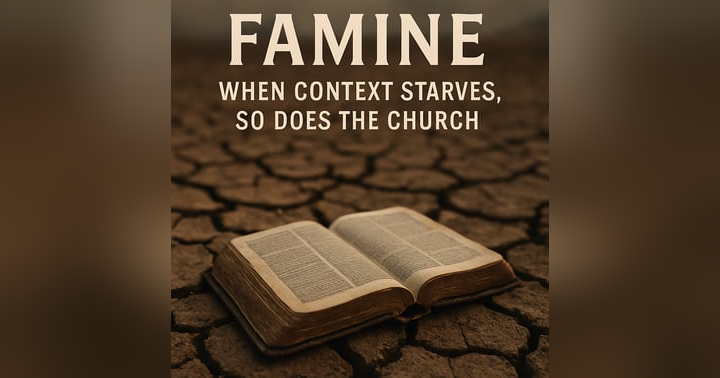The Sling, the Crown, and the Crisis of Identity: Rethinking David and Goliath

The Context of Tension, Part One
We have often talked a lot of about context and why it matters in the Bible. When you are aware of it, it makes the story come alive and more importantly, we are able to reference it as it was intended. Too many times we rip off the authors by bending a story to fit our present day issues.
Tension is a great example of context because in many stories, things are happening. There are issues, there are wars, there is distress, people die, families lose everything and we some skip over those moments to get to the part we are interested in. If we were to slow down and sit in some of these tragedies, it would help us understand what is happening. A good example would be in several stories such as Ruth where the book starts out that women's lives were suddenly disrupted where they lost everything, land, spouses and children. A healthy reaction would be to stop reading and sit back and more or less absorb the enormity of all that. In Jewish culture this is a serious and defining moment. Instead we want to rush ahead without acknowledging what just happened.
An Example of Tension
Here is an one example of tension. Are there more? Of course, but for the sake of readability we are keeping it to two to get our point across. Remember this is a deeper layer of context but our 5 W's still ask us to ask the good questions
David vs Goliath vs King Saul
- Who is the author writing too?
- Who is the author?
- Where is this happening?
- Why is this story being told?
- When is the timeframe?
- What is this story really about?
What we are generally taught:
- Who is the author writing too? Israelites
- Who is the author? It is not exactly known, so the meaning is often skewed.
- Where is this happening? At the battlefield
- Why is this story being told? That David full of faith can overcome any army giant that defies the living God.
- When is the timeframe? During the reign of King Saul (who ruled approx. 1050–1010 BCE)
- What is this story really about? It's about how God chooses a small child to represent him even though he has no nobility or reputation to speak of.
How Better Context helps us understand this story and the tension theme in it.
- Who is the author writing too? Israelites longing for restoration in a historical context, and communities wondering how they lost everything.
- Who is the author? The traditional view is Samuel wrote the first portion of the book, and Gad and Nathan (prophets during David’s reign) completed it after his death. (in chapter 25) The scholarly view says the books were written from multiple sources such as court records, Prophetic narratives, and oral traditions. The final author/editor is anonymous but likely a Deuteronomistic historian — part of the same school that shaped Joshua, Judges, and Kings.
- Where is this happening? The Valley of Elah (the battle site) sits between Gath (Philistine territory) and Bethlehem (David’s home), making it a borderland showdown
- Why is this story being told? To show how leadership rises and falls based on obedience to God, not just status or appearance
- When is the timeframe? Between 1050-1010 BCE. Israel was still tribally fractured, Saul was king, but the monarchy was young, and military cohesion was weak. The Late Iron Age I period (roughly 1200–1000 BCE) was a time of transition.
- What is this story really about? There are many topics that are begging to be explored here, much more than a boy beating a giant in battle.
| Traditional View | Contextual View |
|---|---|
| Who’s the author writing to? Israelites in general | Israelites looking back on the rise and fall of their kings |
| Who’s the author? Unknown (possibly Samuel) | Compiled from prophetic, royal, and oral sources, likely finalized by a Deuteronomistic historian |
| Where? Valley of Elah | A symbolic borderland between Philistine threat and Israelite insecurity |
| Why? To show that God can use a boy to defeat a giant | To expose the failures of Saul’s leadership and introduce God’s kind of king |
| When? Early monarchy, ~1050 BCE | A fragile time of national formation and tribal disunity |
Reflection points
There are so many considerations in this deep and rich story line that I cannot possibly do all of it justice in this short article. This was a time of transition. The people demanded a King and Saul was the man put in charge. He was insecure at the beginning but that insecurity plays a key role in how the story of King Saul's relationship with David developed
I want you to think for a moment about Saul, it is stated quite plainly that Saul was a Benjamite, that was his clan. Each clan had some sort of talent or reputation that they were known about by everyone. We don't really know this but the Israelites understood it perfectly.
So what were the Benjamites known for? The tribe of Benjamin was renowned for its warriors, especially their skill with the sling and their left-handed precision in battle. That’s not just poetic, it means Benjamin had an elite squad of precision slingers, deadly accurate from long distances. This is hundreds of years before Saul, but the tribal reputation persisted. He was the King, and his clan's reputation is that they are masters with the sling and Saul is not even at the battle. Why not? That's the question I ask, why in the world is he not there? If I asked this question, do you think some of his soldiers asked the same thing?
Now here comes a kid — not a Benjamite, but from Judah — with a sling in his hand and no armor on his back. And he does what Saul should’ve done. That cuts even deeper. Saul, the king from the tribe known for its slingers, doesn’t even show up. David, from a different tribe entirely, walks into the battlefield and wins.
How do you think that sat with Saul?
Sure the story tells us he was grateful at first. However I find it hard to believe that some jealousy and animosity started to build up in Sauls behavior that made him detest David over time. This is tension at its finest. We miss it most of the time. It explains why King Saul was always so easily ticked off and aggravated that David did something he should have done in the first place. Was this a changing time in how kings were viewed by their people? Sure Was it a time of transition for the Israelites? Of course it was. But that tension between legacy potential and personal insecurity is striking. Think about how people feel today about their self image. Its certainly a hotspot debate as we interact with people who view themselves differently. In the Saul–David story, identity, expectation, and failure collide in a way that creates psychological and spiritual unrest.
What do we do with this?
Resist the temptation to turn this story into a moral lesson about your life. It's not about you. It's about a nation in transition, a king unraveling, and a boy stepping into a vacuum of failed leadership.But if anything, let this provoke you:
But if anything, let this provoke you:
Where are we avoiding the tension in our own spiritual communities?
Who are we ignoring because they don’t fit our expectations of who should lead?
And what happens when God moves through someone unexpected....again?


